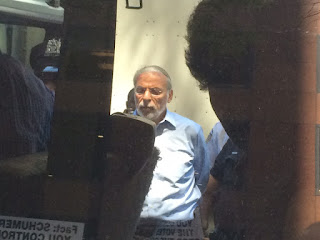The Obama administration is preparing to release convicted Israeli spy Jonathan Pollard,according to U.S. officials, some of whom hope the move will smooth relations with Israel in the wake of the Iran nuclear deal.
Such a move would end a decadeslong fight over Mr. Pollard, who was arrested on charges of spying for Israel in 1985 and later sentenced to life in prison. The case has long been a source of tension between the U.S. and Israel, which has argued that a life sentence for spying on behalf of a close U.S. partner is too harsh. For decades, Israel has sought Mr. Pollard’s early release only to be rejected by the U.S.
Now, some U.S. officials are pushing for Mr. Pollard’s release in a matter of weeks. Others expect it could take months, possibly until his parole consideration date in November. Some U.S. officials strongly denied Friday there was any link between the Iran deal and Mr. Pollard’s prospective release, saying that any release decision would be made by the U.S. Parole Commission.
A White House spokesman referred questions to the Justice Department, where a spokesman declined to comment on a matter which may be before the Parole Commission.
Israeli Prime Minister Benjamin Netanyahu has been a vocal opponent of the deal struck between Iran and six world powers to curb Iran’s nuclear program. Discord between Israel and the U.S., longtime allies, has led to a deteriorating relationship that is the stormiest it has been in decades.
Mr. Netanyahu has personally pressed for years to get the U.S. to release Mr. Pollard, who is currently serving time in a federal prison in Butner, N.C.
Mr. Pollard, 60 years old, was a civilian analyst with the U.S. Navy when he was arrested for passing secret documents to Israel. He eventually pleaded guilty and was sentenced to life.
The mechanism or likely rationale for freeing Mr. Pollard couldn't immediately be learned. The most likely scenario would be to free him when he first becomes eligible for parole in November, according to some U.S. officials.
Anne Henderson Pollard and Jonathan Pollard at their wedding Aug. 9, 1985, in Italy. PHOTO:GETTY IMAGES
Under sentencing laws at the time he was convicted, Mr. Pollard has to be considered for parole after 30 years. The Bureau of Prisons website currently lists his possible release date as Nov. 21, which is the date the federal parole commission is slated to consider whether to end his sentence.
A parole hearing for Mr. Pollard was held in early July. Mr. Pollard’s lawyer, Eliot Lauer, said he hasn’t heard from the parole commission “and I would expect that either I or my client would be the ones who would be notified.’’
Last year, President Barack Obama told an Israeli interviewer: “I have no plans for releasing Jonathan Pollard immediately but what I am going to be doing is to make sure that he, like every other American who’s been sentenced, is accorded the same kinds of review and the same examination of the equities that any other individual would provide.’’
To get out before November would require unusual intervention. In the federal prison system, often the easiest way to free an inmate early is to cite deteriorating health. Mr. Pollard’s supporters say he is suffering from a host of medical ailments that should qualify him for mercy.
The U.S. has considered releasing him before but always backed away from such a move, largely because of opposition from senior leaders at the Central Intelligence Agency, the Federal Bureau of Investigation, and the Justice Department.
It is possible such opposition could again scuttle any release, but it appears his chances at winning freedom are better now than they have ever been, U.S. officials said. Some U.S. officials have concluded he will be a free man before the year is over, these people said.
The prospect of Mr. Pollard’s freedom still grates on many U.S. intelligence officials, in part because his release wouldn’t likely come as part of like-for-like swap, as is often how espionage cases are resolved. Other officials counter that 30 years is a fair punishment and that keeping Mr. Pollard in prison until he dies would serve little purpose.
Mr. Pollard has explained his espionage activity by citing a great affinity for Israel, though counter-intelligence officials say he was paid tens of thousands of dollars for his work.
From June 1984 through November 1985, Mr. Pollard removed large amounts of highly classified U.S. intelligence from his office, made copies and delivered it to Israeli operatives.
About a year after his spying began, federal agents stopped Mr. Pollard as he was leaving work and questioned him about the possible unauthorized removal of classified information.
During that conversation, he twice took breaks to call his wife, using a prearranged code word “cactus,” signaling that she should remove a suitcase full of classified information from their apartment. She also pleaded guilty and served three years in prison and later moved to Israel.














